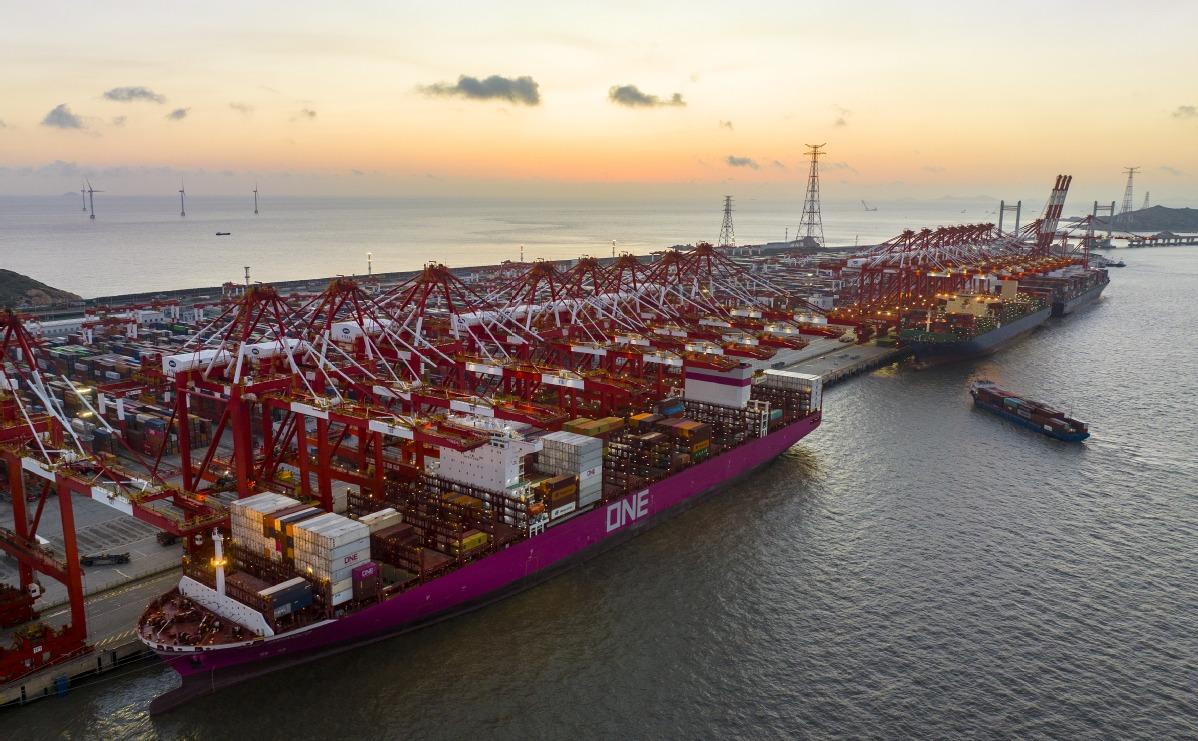 Containerships wait to be loaded/unloaded at Yangshan Port in Zhoushan, Zhejiang province, on Aug 13, 2023. (JI HAIXIN / FOR CHINA DAILY)
Containerships wait to be loaded/unloaded at Yangshan Port in Zhoushan, Zhejiang province, on Aug 13, 2023. (JI HAIXIN / FOR CHINA DAILY)
With China planning to sign more high-quality cooperation deals with its partners for jointly developing the next phase of the Belt and Road Initiative, many domestic companies are devising fresh strategies to enhance their market footprint in countries and regions involved in the BRI, injecting impetus into global trade.
The annual Central Economic Work Conference held in Beijing last week called for efforts to support the development of high-quality BRI projects, saying that "both major signature projects and 'small yet smart' livelihood programs should be promoted".
Shandong Diamond Heavy Industry Machinery Co Ltd, a Yucheng, Shandong province-based excavator manufacturer, has been heading in that direction. The company said it will continue to pursue high-end, service-oriented transformation and consolidate its ability to reach more clients across the world.
The company said its overseas orders are expected to increase by 90 percent on a yearly basis this year.
It began exporting excavators in 2007 and has since successfully marketed its products in over 30 countries and regions. These include Russia, Central Asia and Southeast Asia, with a significant portion of these markets involved in the BRI.
Currently, one out of every four of China's wheeled excavators exported to Central Asia and Russia is manufactured by the company, it said.
Since strengthened business connections among economies taking part in the BRI have played a key role in addressing issues such as unbalanced growth and deficiencies in economic governance, the National Development and Reform Commission, China's top economic regulator, said last week that the country will continuously deepen strategic coordination with other BRI countries in the coming years, especially in the areas of foreign trade, digital economy, infrastructure and green development.
Xu Jianping, director of the Department of Regional Opening-up at the NDRC, said that China will enhance cooperation on projects for new types of infrastructure and support companies to participate in the development of transportation and communication infrastructure projects — as well as electric vehicle and photovoltaic manufacturing projects — in countries and regions involved in the BRI.
Such infrastructure will include optical cables, cross-border interconnectivity facilities, international submarine cables, next-generation mobile communication networks and data centers, said the NDRC.
The import and export value of China's private companies grew 6.1 percent year-on-year to 20.24 trillion yuan ($2.84 trillion) in the January-November period, accounting for 53.3 percent of the country's total foreign trade value, said the General Administration of Customs.
Meanwhile, the country's foreign trade value with other economies participating in the BRI over the same period amounted to 17.65 trillion yuan, up 2.6 percent year-on-year.
As many BRI economies embark on a new phase characterized by sustainable development and growth propelled by innovation, Higer Bus Co, a bus and truck manufacturer based in Suzhou, Jiangsu province, said the export value of its new energy buses soared some 37.3 percent year-on-year to 1.44 billion yuan in the first 11 months of the year.
Li Jinling, a sales manager at Higer, said that more than half of the orders were placed by clients from BRI economies. The company will continue to expand its sales networks in countries such as Saudi Arabia, South Africa and Malaysia next year.
The BRI strives for elevated standards, sustainability and improved quality of life, said Li.
In contrast to certain endeavors that focus on a zero-sum mentality, the BRI underscores high-caliber and mutually beneficial collaboration in the pursuit of collective wellbeing and shared interests. It is dedicated to fostering open, environmentally friendly and clean cooperation, thus promoting inclusive and sustainable development, said Wang Wen, executive dean of Renmin University of China's Chongyang Institute for Financial Studies.


